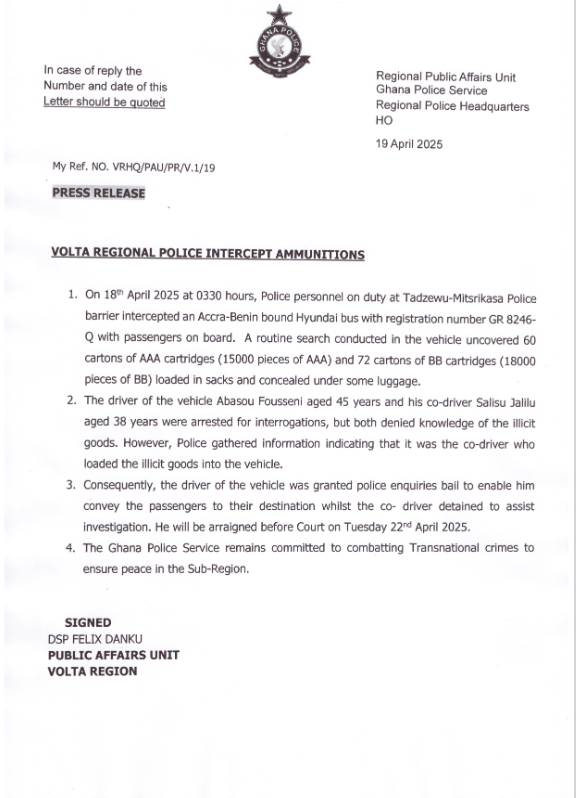A routine security operation in Ghana’s Volta Region led to the interception of a substantial illegal ammunition shipment early Friday, underscoring ongoing efforts to combat cross-border crime.
Officers at the Tadzewu-Mitsrikasa Police barrier halted a Hyundai bus (GR 8246-Q) traveling from Accra to Benin around 3:30 a.m. on April 18, 2025, discovering 33,000 rounds of ammunition concealed beneath passenger luggage.
The haul included 60 cartridges of AAA-grade ammunition (15,000 rounds) and 72 cartridges of BB-grade ammunition (18,000 rounds), packed in sacks and hidden in the vehicle’s cargo hold. Volta Regional Police spokesperson DSP Felix Danku confirmed the seizure, noting the bus was en route to neighboring Benin, a detail raising concerns about regional arms trafficking networks.
Two suspects driver Abasou Fousseni, 45, and co-driver Salisu Jalilu, 38 were detained for interrogation. While both denied awareness of the cargo, investigators identified Jalilu as responsible for loading the contraband. Fousseni was later released on bail to complete the passenger journey, while Jalilu remains in custody ahead of a scheduled court appearance on April 22.
Authorities highlighted the interception as part of broader strategies to disrupt transnational crime syndicates operating across West Africa. The seizure follows heightened vigilance at Ghana’s border checkpoints, with security agencies increasingly targeting illicit goods moving along the Accra-Cotonou corridor, a known transit route for regional smugglers.
This incident coincides with recent regional security collaborations, including joint operations by Ghana, Togo, and Benin to curb arms proliferation linked to Sahelian instability. Analysts note the interception reflects both improved policing capabilities and persistent challenges in monitoring porous borders, where legitimate commercial traffic often masks clandestine activities.
The Volta Regional Police Command has urged transport operators to verify cargo legitimacy, emphasizing stricter penalties for complicity in smuggling operations. As investigations continue, the case highlights the delicate balance between facilitating cross-border trade and securing frontiers in an era of escalating regional security threats.






